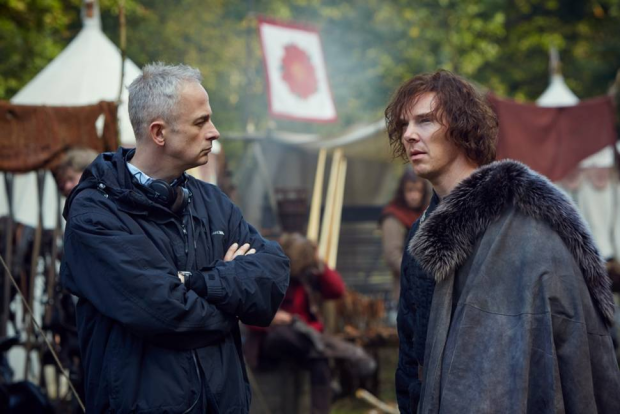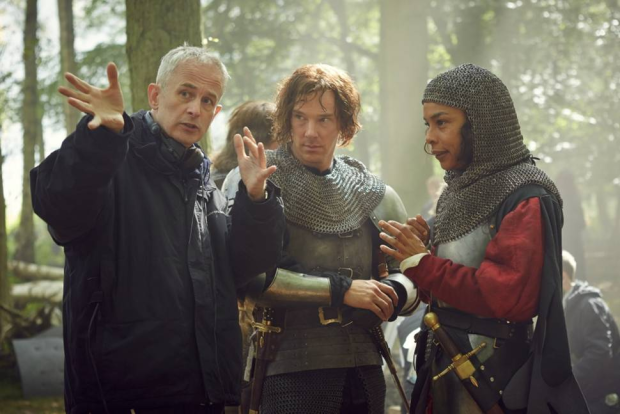Dominic Cooke: 'We mustn’t get stuck to an idea of how Shakespeare should be'

Hollow Crown: The Wars of the Roses is an absolutely mammoth project – three Shakespeare plays in three episodes. Did it take some convincing for you to get on board?
Yes, it did actually. I was incredibly flattered to be asked to do it but it was a huge-scale project and it took a bit of working out how we would do it, before I said yes. But I had been thinking about doing something on screen for a while, and I love Shakespeare. I realised this would be as good a training as I was ever going to get.
So this is your screen directorial debut?
Yes! There were some areas where obviously it was similar to directing plays and some that were incredibly different. I was working with actors, shaping their performances and working on Shakespeare, which I’ve done a fair bit of. But the cameras and planning shots were all very different.
Did you enjoy watching the original Hollow Crown?
I think the Richard II is the best I’ve ever seen. It’s such a difficult play and that rendering of it is so clear. In the lead up to this I watched every Shakespeare on film I could get my hands on. I watched a lot of war films as well to work out how to make the battle scenes convincing when you’ve only got fifty extras.
Game of Thrones would be good for that, did you watch it?
No, I didn’t actually – I thought it might lead me up the wrong path. But people have said it’s quite like Game of Thrones, which makes sense because Game of Thrones was based on Henry VI.
Presumably you had to cut quite a bit – was that excruciating?
I’ve never done a Shakespeare that I haven’t cut. The interesting thing about the process was less how Ben [Power] and I were going to get it down to size and more what story we were going to tell. The thing about the Henry VI plays is that they are very disparate especially the first one. We needed to shape it in a way that holds people’s attention and try to get to the core of what people thought the stories were about. There’s probably about fifty per cent of the original text in it.
Judi Dench, Benedict Cumberbatch, Sophie Okonedo and many more – you managed to get the most amazing cast – what was it like working with them?
A lot of actors had seen the original Hollow Crowns and knew the kind of production values we were using so wanted to be involved. Actors often love doing Shakespeare but if you have a busy film and TV career you don’t have time to commit to the long run involved in theatre. Hugh Bonneville, for example, he’s actually spent a lot of time at the RSC and performing Shakespeare. I think he really relished the chance to do some again. It is a great mix of people including some who had never done any Shakespeare. Tom Sturridge and Keely Hawes hadn’t done any and they were brilliant.

Does this mean you’re going to be focusing on screen rather than stage from now on?
No, I love working in the theatre, but I have really been bitten by the bug. It’s exciting at this point in my life to be learning something new. I’m making a film later this year, but I’m associate director at the National and I want to keep doing plays.
How does it feel to be contributing in such a big way to the Shakespeare 400 anniversary?
It wasn’t actually planned to land now but I am very happy that it’s happened because it’s a moment when we’re all turning our attention to Shakespeare’s work. It’s very important that his plays are performed and re-invented. The tradition needs to keep evolving so we don’t get stuck to an idea of how Shakespeare should be. One of the things that’s great about being involved in Hollow Crown is that television has the ability to reach people who never go to the theatre. You want the Shakespeare 400 to bring lots of people to Shakespeare who don’t know his work at all.
Do you think it is still hard to get people into Shakespeare, even now?
I think the language can be intimidating. I think you develop an understanding and appreciation of it the more you see, watch and read it. It’s really important how people come to it. If you go and see a really boring production or have a boring session at school it’s very hard to have any connection with the plays. It’s the quality of the way people engage, which is why I think the RSC, the National, the Globe are all doing great work in bringing people to the work.
Presumably you had to shoot in lots of lovely locations, any favourites?
We found some great places and spent a lot of time trying to get rid of light switches or handrails and drain pipes. A couple of times we were under a flight path and had a lot of planes flying over. But there are so many scene and shots that I really like. There were some incredibly emotionally powerful scenes with Tom Sturridge, some great political scenes in the Great Hall at Winchester. And some of the battles came off really well. We did one in a town, one in a river and one in a forest. The one in the river I’m particularly pleased with.
Will you be sitting down with a massive bowl of popcorn and watching them?
I’ve seen them, I don’t want to have to watch them again! But I might watch a little bit of it on telly because I’ve never had anything on telly before.
Hollow Crown: War of the Roses is broadcast May 7 (Henry VI PI), May 14 (Henry VI PII) and May 21 (Richard III).
The Hollow Crown: The War of the Roses is released on Blu-Ray and DVD on 20 June from Universal Pictures.










